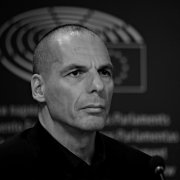Past Event
Spitzenkandidaten series: Yanis Varoufakis
The first event in the The Road to Europe - Brussels Briefing Live: Spitzenkandidaten series. The series features the lead candidates for the European Elections of six parties and is jointly organised by Bruegel and the Financial Times in March and April 2019.
Video & audio recordings
SUMMARY
To kick off the Spitzenkandidaten series hosted jointly by Bruegel and The Financial Times, Yanis Varoufakis, the former Greek Finance Minister and the lead candidate of DiEM 25 for European Commission President, discussed his economic programme. For each of the Spitzenkandidaten series events, the candidates field a series of questions in four main “sections”. The sections are (1) Sustainability and Growth, (2) Trade Policy, (3) Eurozone Reform, and (4) Industrial Policy and Competition Policy.
In the first section on Sustainability and Growth, Maria Demertzis, the Deputy Director of Bruegel, asked Varoufakis how he would address lagging productivity growth in the EU. He explained that the EU is indeed falling behind the United States and China in terms of investment and productivity. His central plan to address this issue would be to promote investment. He stated that investment is the key to productivity and to creating a more green economy. He also emphasized the importance of promoting investment in clean energy sectors in order to protect the environment and to decrease European dependence on Russia for energy. In order to achieve this sustainable increase in productivity, he would make a requirement for 5% of annual GDP to be invested in the creation of sustainable jobs. The funding for this investment would come from the EIB (European Investment Bank), which would issue bonds for the specific purpose of funding the endeavor. The EIB would not pick the projects for investment, however, as Varoufakis insisted that such a situation would be anti-democratic. Instead, he would work to create a Green Transitions Works Agency which would choose the projects for investment. Further on the topic of Green Growth, Varoufakis explained that there is a need to heavily tax industries that emit large amounts of CO2 and to redistribute this tax income to poorer Europeans so they can see that Europe is working for them.
In the second section on Trade Policy, Varoufakis was asked what his trade agenda would be. First, he explained that he is adamantly in support of free trade, yet wants to make sure that Europe’s ability to have autonomy in conducting free trade is not usurped by multinational organizations. The tone of his remarks suggested that he does support multilateral trade organizations but simply wants to make sure that there is democracy in the creation of international trade rules. Next, he explained that trade wars are a major concern for Europe, especially in the sense that they can undermine European unity. He expressed that the European response to American tariffs has increased tensions between France and Germany, and he expressed a desire to formulate a coordinated retaliatory plan that would ensure the US learns it can not bully Europe on trade issues. To finish his trade policy analysis, Varoufakis explained his policy on Brexit, stating that he would be pushing for Britain to remain in the FTA and Customs Union for as long as possible. Then, in about five years time, he would hope that the UK would either seek to reenter the EU or pursue a new trade relationship entirely. The most important aspect of his proposal is that it would eliminate the tension over the Irish backstop by keeping the UK in the customs union.
In the third section on Eurozone reform, Varoufakis focused on the need for reform of the rules of the European Commission. His main idea was that the Commission needs to change their rules in a way that allows them to be enforced. When he was the Finance Minister of Greece, he was asked to underwrite loans to banks that were failing so that the EU could provide liquidity. He stated that the commission needs to reform the fiscal contract so that it works for all countries, and he advocated for incentivizing fiscal restraint by providing investment from the EIB (European Investment Bank) for the economies that do comply with recommended fiscal policies.
In the last section of industrial and competition policy, Varoufakis discussed the importance of competition laws. Though there has been much talk of creating European “champions” of industry through government support, Varoufakis explained that this would actually harm EU industrial policy. He explained that Google did not come about because people in silicon valley coordinated to create a giant through anticompetitive measures. Rather, it was the result of a system that allowed for natural competition, innovation, and risk-taking. He states that creating an environment such as this one is the best way for Europe to compete with the US and China in industry and innovation.
In the Q&A section, Varoufakis continued to express the importance of investment in the EU. He also explained the importance of acting realistically and reforming the EU commission’s policy so that it engages with the world in a realistic manner.
Event notes by Davis Cousar
This event is a part of a series of talks and debates with Europe’s Spitzenkandidaten and political leaders. Journalists from the FT, along with a Bruegel Director or a senior scholar, will explore and challenge the main political parties’ policies for the future of the continent in front of an invited audience. The events will be livestreamed on the Bruegel website. For more events see: www.bruegel.org/europe2019
Schedule
12:30-13:00
Check-in and lunch
13:00-14:15
Conversation
Chair: Martin Sandbu, European Economics Commentator, Financial Times
Maria Demertzis, Interim Director
Yanis Varoufakis, Former Greek Finance Minister and lead candidate for DiEM25
14:15-14:30
Q&A
14:30
End
Speakers

Maria Demertzis
Interim Director

Martin Sandbu
European Economics Commentator, Financial Times

Yanis Varoufakis
Former Greek Finance Minister and lead candidate for DiEM25
Location & Contact
Matilda Sevon
[email protected]












